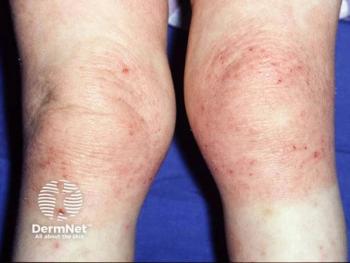
- Dermatology Times, April 2020 (Vol. 41, No. 4)
- Volume 41
- Issue 4
Abrocitinib works quickly in atopic dermatitis
A phase 2 study shows that the oral Janus kinase (JAK) 1 inhibitor abrocitinib quickly improved atopic dermatitis (AD) severity and symptoms versus placebo with some measures achieving statistically significant separation in days.
A phase 2 study shows that the oral Janus kinase (JAK) 1 inhibitor abrocitinib quickly improved atopic dermatitis (AD) severity and symptoms versus placebo with some measures achieving statistically significant separation in days.
“We saw people having unbelievable clearance within weeks, which the data demonstrate. It was extremely surprising and very welcome for subjects on the trial,” says study co-author Seth B. Forman, M.D. He is owner of ForCare Medical Group in Tampa, Fla.
Investigators led by Melinda J. Gooderham, M.D., of SKiN Centre for Dermatology in Peterborough, Ontario, Canada, randomized 267 adults with moderate-to-severe AD to daily treatment with abrocitinib (200, 100, 30 or 10 mg) or placebo. In the 200 mg group, the proportion of patients who achieved Investigator Global Assessment (IGA) success from baseline peaked by weeks four to six and persisted through week 12.
At 12 weeks, the proportions of patients in the 200 mg and 100 mg groups who achieved IGA scores of clear or almost clear with a two-point improvement over baseline were 43.8% and 29.6%, respectively, versus 5.8% for placebo-treated patients. A three-parameter maximum effect model used to characterize the dose-response relationship showed an IGA success rate of 44.5% for those receiving 200 mg abrocitinib. Gooderham et al. note that this figure is comparable to the approximately 40% of patients who achieved this endpoint in phase 3 dupilumab trials, although direct comparison between the studies is impossible.
Eczema Area and Severity Index (EASI) reductions showed significant improvement over placebo by week one in the 200 mg group and week two in the 100 mg group; these reductions peaked by weeks four to six and were maintained for both groups. Week 12 EASI reductions for patients in these groups were 82.6% and 59.0%, respectively, versus 35.2% for placebo.
Regarding symptoms, pruritus scores showed significant improvement over placebo within two days of treatment in the 200 mg group (odds ratio 6.09; 90% confidence interval/CI 1.35-27.59; p = 0.049). At week 12, least squares mean (LSM) differences versus placebo for the 200 mg and 100 mg doses were -25.4% (p = 0.003) and -20.7% (p = 0.02), respectively.
Among treatment-related adverse events, only gastrointestinal disorders were reported substantially more often for abrocitinib-treated patients than for those receiving placebo. At the 200 mg dose, five patients (9.1%) experienced diarrhea, and eight patients (14.5%) experienced nausea. The gastrointestinal events did not appear to impact adherence or study withdrawal but will be monitored in future studies. Although platelet-count reductions peaked at week four in the 200 mg and 100 mg cohorts (-29.8% and -11.4%, respectively), these levels trended toward normalization with continued treatment.
“For the JAK inhibitors as a class,” says Dr. Forman, “we need to monitor safety issues such as liver enzymes, platelets, neutrophils and tyrosine protein kinase (TPK). It’s a different mechanism of action than dupilumab, and, therefore, we have different issues that we need to monitor for. However, the data presented and published show that the safety profile is excellent.”
Study limitations include a high discontinuation rate (nearly 50% at lower doses), driven largely by lack of efficacy in the placebo, 10 mg and 30 mg groups. Although use of other AD medications including topical rescue medications amounted to protocol-mandated discontinuations, investigators say, rescue-medication usage and study withdrawal rates were consistent with similar studies.
“We’re having significant clearance with a new mechanism of action that’s being introduced to dermatology in the form of a JAK inhibitor,” says Dr. Forman. Patients and physicians eagerly await the new medication, he adds. “Pfizer is working very hard to make abrocitinib available for patients who either do not respond to existing therapies or are needle-phobic.”
Disclosures:
Dr. Forman is an investigator for AbbVie, Dermira, Eli Lilly, Pfizer, Regeneron and XBiotech in the AD space.
References:
Gooderham MJ, Forman SB, Bissonnette R, et al. Efficacy and safety of oral Janus kinase 1 inhibitor abrocitinib for patients with atopic dermatitis: a phase 2 randomized clinical trial. JAMA Dermatol. 2019;155:1371-1379.
Articles in this issue
almost 6 years ago
COVID-19 pandemic requires vigilance, not panicalmost 6 years ago
Microneedling plus radiofrequency effectivealmost 6 years ago
Treatment options for acne expandalmost 6 years ago
An update on antibiotic use for acnealmost 6 years ago
COVID-19: Experts discuss virulence, potential treatments, controversiesalmost 6 years ago
Novel topical foam promising for papulopustular rosaceaalmost 6 years ago
A paradigm shift in squamous cell carcinoma treatmentalmost 6 years ago
Nuogen Pharma: Innovation in the fight against itchalmost 6 years ago
Expert discusses hair loss treatment controversies, concernsalmost 6 years ago
Targeted therapies for advanced basal cell carcinomaNewsletter
Like what you’re reading? Subscribe to Dermatology Times for weekly updates on therapies, innovations, and real-world practice tips.











